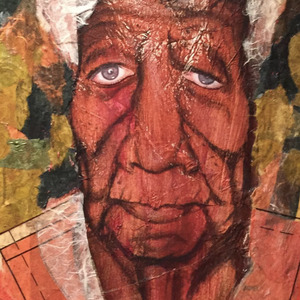Art Passion Origins: Support and the Lack Thereof
"They didn't get me. They didn't understand me for a long time because, even now, when I think about it, it probably just sounds crazy because as a kid, I was interested. I didn't know exactly how I was going to maneuver this journey, but I knew there was something about the arts that I really really loved. It wasn't dance, it wasn't performance, or anything like that."
Wendy Kendrick ('76)
Based on an assessment of arts education offered across the nation in the 1970s, Coming to Our Senses: The Significance of the Arts in American Education, the Arts, Education, and Americans Panel concluded that there were “serious deficits” in arts education during this time. This report parallels the experience Wendy Kendrick faced in attempting to pursue an art passion from a young age. Although Kendrick remembers having her first art teacher in the fourth grade, she emphasized how her school lacked resources to allow her to fully pursue her passion because she had to “bring materials from home” during high school. Additionally, when a teacher tried to help connect her to The Living Arts Center for an opportunity, Kendrick was ineligible for the program because she was not a resident of the city in which the center was located. Fortunately, the teacher put in a word for Kendrick, and they accepted her. These structural obstacles demonstrate the scarcity of arts programs and education in her home city. To pursue her passion, Kendrick had to look elsewhere.
Unsurprisingly, this scarcity may explain why Kendrick spoke a lot about how her parents did not initially support her art passion because they “surely did not know any artist.” In fact, when Kendrick first attempted to tell her mom that she was intrigued by glassblowing, her mother looked at her like she was an alien who had just landed. Had her parents known artists or had more familiarity with arts education, they would have been more likely to fully support her art passion.
One person, however, did constantly fuel her art passion from the start: her grandmother who was nicknamed “Big Momma.” Her grandmother was a seamstress who sewed for people in their close-knit community in Ohio. Kendrick recalls sitting at her feet and watching her grandmother sew. Kendrick received little support from her parents and felt ill-equipped by the school system, but her grandmother was able to serve as a pillar as she embarked on her art journey.
Wendy Kendrick ('76)"I just stuck with my grandmother. I loved everything that she did. I loved to sit at her feet when she was sewing on that old sewing machine and all of these scraps would fall to the floor and she would take those. I had Barbies back then. She would make these clothes for my Barbie dolls and they were the best... She always felt she got me. She understood me. She just fed that creative part of me."
The lack of support from school faculty continued during her high school career and time at Dartmouth. Kendrick explained how in high school, nobody shared the same level of passion she had for art; there were only guys in her class who enjoyed drawing. While at Dartmouth, she also rarely had peers who shared the same passion for art.

